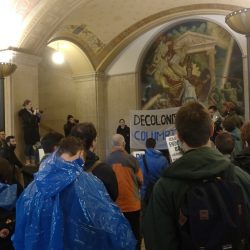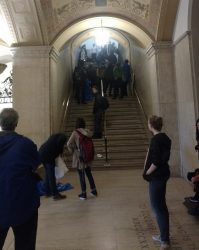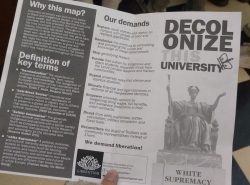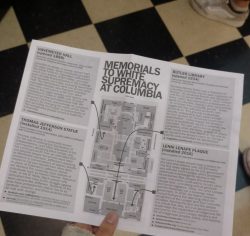On April 25th, Butler Library was briefly occupied by the Liberation Coalition, a collective focused on “decolonizing Columbia.” Bwog Staff Writer Megan Wylie was at the occupation, and had the chance to speak to members of the group to gain insight into their motivations for the protest.
In the midst of the graduate workers’ strike, at about 1:25 pm on Wednesday, a group known as the Liberation Coalition gained access to Butler through entering with a prospective student tour group, and occupied the main stairway between the 2nd and 3rd floors for approximately 45 minutes. Although an administrator who arrived on scene threatened to call the police and take protesters’ IDs, no IDs were taken and the police was not called.
The group was formed in response to CUCR’s speaker series earlier in the year, and is focused on ending what they see as Columbia’s relationship with white colonization and systematic racism. They claim that this relationship, which they outlined in speeches and a flyer they handed out to bystanders, is expressed through racist statues and names on campus, a curriculum centered upon white men and intrinsically connected to colonization, the gentrification of Harlem, and institutional biases against students of color marginalized by white supremacy. Their demands seek to combat this connection between Columbia and colonization. These demands include: “Replace racist statues and names on campus with people of color who resisted oppression;” “Decolonize the curricula by centralizing and privileging the voices and knowledge of marginalized people;” “Stop gentrifying Harlem;” “Provide free tuition for Indigenous and Black students, especially those from the Lenni Lenape diaspora and Harlem communities;” “Allocate financial and legal resources in defense of all marginalized communities;” and “Divest from white supremacy, settler colonialism, military occupation, and fossil fuels.”
Although these demands are significant and wide-reaching, the protesters in Butler today primarily sought to disrupt the normal flow of Columbia life and educate students about their cause. The collective consists of both graduate and undergraduate students, and does not have individual leaders.
As they marched through Butler, they carried signs that referenced the Boycott, Divestment, and Sanctions movement, as well as a large banner that said “DECOLONIZE COLUMBIA UNIVERSITY.” In response to their chants, several students began yelling at the protesters, calling them disruptive and obnoxious.
“You have acres of colonized land to study on,” one protestor responded.
The three main speakers asked to remain anonymous, as not to detract from the collective nature of the group. They criticized the University’s choice to send the black Dean of Students at the Law School to mediate the protestors. The Dean of Students at the Journalism School was also sent to help handle the situation, as was a Public Safety representative. Only one student was asked to provide his ID, and the protestors believe it was because he is not white. Despite this, the police were not called and both the Public Safety representative and the woman who was preventing the protesters from proceeding up the stairs stayed relatively calm.
Some students who were in the library escalated the conflict by yelling at the protesters, calling them rude and accusing them of improper protesting. Certain students criticized the group’s support of the BDS movement, a topic that has been especially contentious in the past few weeks given SGA’s recent referendum. The employees tasked with dealing with the occupation tried to de-escalate the situation, and directed students to return to studying while allowing the group to stay in the stairway.
When asked about what their intention was with today’s occupation, the Coalition told Bwog the following:
We want to engage students in dialogue like we did today. Earlier today, we worked in solidarity with UAW and the Native American Council to walk around campus to talk about the figures we see and what that represents. And our message is a message of decolonization. Decolonization meaning looking back on our roots as people of color and looking at the atrocities that have happened in this nation, and ways in which we can move forward and acknowledge that generational trauma. But in that acknowledgement to fight for a better future and the way that we’re doing that is through the curriculum of these conversations.
The group was particularly vocal about who was sent to address the protest, asserting: “Notice how they used a woman of color as a body, as a barrier way to mediate this. We tried to have a conversation with her but that’s what white supremacy does…she’s not capable of having a conversation with us because she’s in a vulnerable position because of her identity. She is a dean of students. We’re not mad at her.” Another member added that it was “reprehensible for the Columbia administration to put her in that situation.” They further argued that this was exemplary of Columbia’s employment of black administrators as a means of appeasing critics rather than actually diversifying the campus.
The Liberation Coalition stated that their intention was to disrupt members of the community so they would be encouraged to consider “why this library is named after Nicholas Butler, who was a Nazi sympathizer. Why do we have one memorialization of the Lenape people? Or Thomas Jefferson who has no association with this university?”
As administrators and public safety officers arrived, the protestors reduced the disruption level of their demonstration: they put their megaphone away, and spoke to bystanders individually. They explained their goals to students who asked questions and spoke to reporters, while continuing to hold up signs. Shortly after 2 pm, after about 45 minutes in the library, the protesters began to file out.
Although this demonstration coincides with the graduate student workers strike, the Liberation Coalition has been planning it for several months and have evolved their demands as they grow to include the voices of other student organizations. It is easy to understand why the group chose to occupy Butler Library, as this building carries the names of figures central to Columbia’s core curriculum and values—grounded, the group would argue, in white supremacy. However, this location also invites a direct comparison with Orgo Night, which, though ideologically very disparate from today’s protest, is a similarly disruptive event which has been pushed outside of Butler by the Columbia administration. It is notable that neither the Marching Band (which stormed Butler 209 last fall) nor the Liberation Coalition has so far faced significant repercussions for disturbing this library.
The representatives of Liberation Coalition to whom Bwog spoke asked that the following definitions be shared. More information can be found on their Facebook page (LiberationCoalition) or by e-mailing them at liberationcoalition@gmail.com.
- Decolonization- The repatriation of indigenous and Black life, land, values, language and knowledge. The recognition of European-American settler colonialism and the marginalization of Indigenous and Black people. [Linda T Smith, Margaret Kovach]
- Anti-Black Racism: Intentional and Unintentional systematic oppression of Black people rooted in slavery that is utilized to preserve a global anti-Black system that exists across political, economic, and cultural domains. [PROP Committee of CUSSW]
- Settler Colonialism: The genocide, forced removal, and replacement of Indigenous populations with a settler society (such as Europeans moving to the Western Hemisphere) that develops a distinct identity and sovereignty on the occupied land. [Roxanne Dunbar Ortiz]
- White Supremacy: A political, economic, and cultural hierarchy designed to control access to resources (such as housing, education, and health care) and reinforce white superiority and domination over people whose physical appearance and cultural practices are different than those found in white Europe. [Frances Ansley, Iris Marion Young]
- Students watching the protest on the ground floor of Butler
- The protest moved to the staircase going up to the third floor after some speeches
- One side of the protesters’ flyer
- Other side of the flyer


 6 Comments
6 Comments





6 Comments
@Anonymous Get out, go to a different college that has less “oppression.” No one is holding you here.
@Now I know how all those laptops are going missing in Butler …
@Anonymous Yep, this comment proves racism isn’t a problem here AT ALL. Great, we can all go home now! … NOT
@Anonymous Exactly – when in doubt, race bait! Unfortunately, those PESKY facts, statistics, and EVERY grainy Public Safety photo of someone walking out of Butler with a student’s laptop aren’t on your side…
@Anonymous A not joke? How nice, snowflake!
@Anonymous Bump!